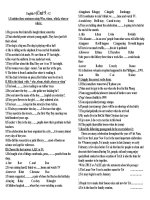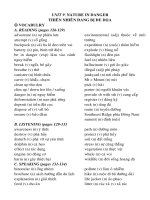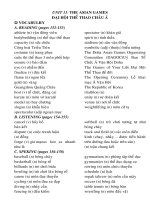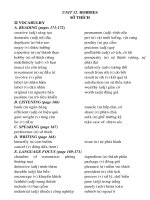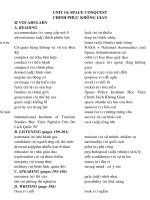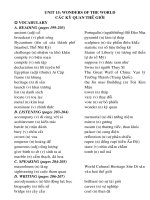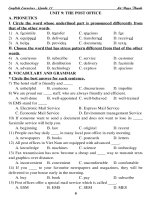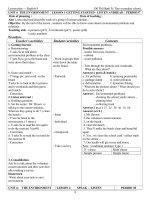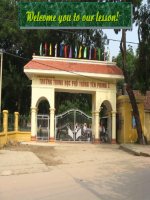E11NC UNIT 9:TV,NP,BT
Bạn đang xem bản rút gọn của tài liệu. Xem và tải ngay bản đầy đủ của tài liệu tại đây (123.63 KB, 7 trang )
UNIT 9: NATURE IN DANGER
THIÊN NHIÊN ĐANG BỊ ĐE DỌA
VOCABULRY
A. READING (pages 126-129)
adventure (n) sự phiêu lưu
attempt (v) cố gắng
backpack (n) cái ba lô đeo trên vai
battery (n) pin, bình trữ điện
be in danger (exp) lâm vào cảnh
nguy hiểm
break (v) ngắt, bẻ gãy
breathe (v) thở
canister (n) bình chứa
carve (v) khắc, chạm
clean up thu dọn
clim up / down leo lên / xuống
danger (n) sự nguy hiểm
deforestation (n) nạn phá rừng
deposit (n) tiền đặt cọc
dispose of (v) vứt bỏ
ensure (v) bảo đảm
environmental (adj) thuộc về môi
trường
expedition (n) (cuộc) thám hiểm
explode (v) bùng nổ
flashlight (n) đèn pin
fuel (n) nhiên liệu
hallucinate (v) gợi ảo giác
illegal (adj) phi pháp
junkyard (n) nơi chứa phế liệu
Mt = Mount (n) núi
pick (v) hái
porter (n) người khuân vác
provide sb with sth (v) cung cấp
register (v) đăng ký
rock (n) tảng đá
route (n) tuyến đường
Southeast Ridge phía Đông Nam
summit (n) đỉnh (núi)
B. LISTENING (pages 129-131
awareness (n) ý thức
destroy (v) phá hủy
disturb (v) phá vỡ sự yên tónh
dolphin (n) cá heo
effect (n) tác dụng
engine (n) động cơ
harm (n) gây thiệt hại
path (n) đường mòn
protect (v) phá hủy
soil (n) đất trồng
stress (n) sự căng thẳng
vegetation (n) thực vật
whale (n) cá voi
wildlife (n) đời sống hoang dã
C. SPEAKING (pages 131-134)
binocular (n) ống nhòm
brochure (n) sách hướng dẫn du lòch
explanation (n) giải thích
feed (v) cho ăn
pollute (v) làm ô nhiễm
hike (n) cuộc đi bộ đường dài
life jacket (n) áo phao
litter (n) rác xả (v) xả rác
Mount Fuji National Park Công Viên
Quốc Gia Núi Phú Só
Vocabulary & Grammar for English 11 Lê Ngọc Thạch
nest (v) làm tổ
note (n) ghi chú
shout (n) la hét
strong (adj) mạnh
sunglasses (n) kính mát
sunlight (n) ánh sáng mặt trời
D. WRITING (pages 134-135)
Acres Burned in the USA Các đồng
cỏ bò cháy ở Mỹ
cleanup (v) thu gom
comparison (n) so sánh
contrast (n) đối chiếu
cover (n) bảo vệ
deforestation (n) sự phá rừng
examine (n) khảo sát
loss (n) sự bảo vệ
Southeast Asia Đông Nam Á
E. LANGUAGE FOCUS (pages 135-138)
ban (v) cấm
compulsory (adj) bắt buộc
crane (n) con sếu
disappear (v) biến mất
discuss (v) thảo luận
flock (n) đàn, bầy
gamekeeper (n) người được thuê để
nuôi và bảo vệ thú
poacher (n) xâm phạm tài sản, người
săn trộm
route (n) tuyến đường
Trang 2
WORD STUDY
* Suffix - al (Tiếp vò ngữ - al) Thêm Suffix - al vào sau:
1. Danh từ để thành lập tính từ
Noun + al Adjective
Ex: education + al educational (có tính giáo dục)
remedy + al remedial (dành cho học sinh yếu kém)
post + al postal (thuộc bưu điện)
option + al optional (không bắt buộc)
2. Động từ để thành lập danh từ
Verb + al Noun
Ex: refuse + al refusal (lời từ chối)
propose + al proposal (lời đề nghò)
rent + al rental (tiền thuê)
dispose + al disposal (sự tống khứ)
GRAMMAR
* Reduced relative clauses (mệnh đề quan hệ rút gọn)
1. Relative clauses replaced by to-infinitive (Mệnh đề quan hệ được
thay thế bởi động từ nguyên mẫu có TO)
Khi rút gọn mệnh đề quan hệ, dùng to-infinitive trong các trường hợp
sau:
a. Sau số thứ tự (the first, the second…)
Ex: I’m usually the first guest to come to a party.
(Tôi thường thường là người khách mời đầu tiên đến buổi tiệc)
b. Sau so sánh bậc nhất của tính từ.
Ex: It’s the most popular route to lead to the summit of Mt.Everest
(Đó là tuyến đường phổ biến nhất dẫn đến núi Everest)
2. Relative clauses replaced by participles (Mệnh đề quan hệ được
thay thế bởi phân từ)
Mệnh đề quan hệ có thể rút gọn thành các cụm phân từ:
a. Hiện tại phân từ (present participal phrase) nếu động từ chính trong
mệnh đề quan hệ mang ý nghóa chủ động.
Ex: Climbers bring with them canisters that contain fuel to cook their
meals.
(Những người leo núi mang theo những cái hộp nhỏ để mà chứa
nhiên liệu để nấu những bữa ăn của họ)
Climbers bring with them canisters containing fuel to cook their
meals.
who/which/that + V(active meaning) V-ing
b. Quá khứ phân từ (past participial phrase) nếu động từ chính trong
mệnh đề quan hệ mang ý nghóa bò động.
Ex: The Sport Games which were held in India in 1951 were the first
Asian Games.
The Sport Games held in India in 1951 were the first Asian Games.
which/that + V(passive meaning) V3/ed
UNIT 9: NATURE IN DANGER
A. PHONETICS
I. Choose the word whose underlined part is pronounced differently from that of the
other words.
1) A. thick B. thorough C. healthy D. weather
2) A. answer B. sweater C. swim D. switch
3) A. smart B. smile C. criticism D. smog
4) A. slow B. isle C. slap D. slave
II. Choose the word that has stress pattern different from that of the other words.
6) A. nature B. danger C. human D. environment
7) A. exist B. species C. effect D. condition
8) A. forest B. water C. destroy D. industry
9) A. environment B. electricity C. population D. ecotourism
B. VOCABULARY AND GRAMMAR
* Circle the best answer for each sentence.
10) Our children’s health is being ____ by exhaust fumes from factories.
A. dangerous B. endangered C. endangering D. popular
11) Many species of rare animals are in ____ of becoming extinct.
A. dangerous B. dangerously C. endanger D. danger
12) Without enough oxygen, you may lose your ability to think clearly and may even
____.
A. breath B. explode C. hallucinate D. pollute
13) ____ on Mt. Everest should bring oxygen bottles with them.
A. Adventurers B. Adventurer C. Adventure D. Adventurism
14) A fund will be set up for the ____ species.
A. dangerous B. endangered C. endangering D. popular
15) Mt. Everest is now known as the world’s highest ____.
A. environment B. canal C. flock D. junkyard
16) A special ____ team has been organized to clean up tons of garbage.
A. danger B. expedition C. summit D. ridge
17) Not surprisingly, the increase of adventurers has led to an increase in the ____
garbage.
A. most B. almost C. amount of D. mostly
18) They need oxygen bottles when they climb to the height of more than 7,000
meters, where there is not enough oxygen to breath ____.
A. for B. by C. with D. in
19) They need fuel canisters, oxygen bottles, batteries, food and drinks for ____ on
the mountain.
A. survival B. existence C. life D. living
20) The Sherpas pick up garbage, put it in their ____, and bring it down to the foot of
the mountain.
A. bags B. backpacks C. wallets D. buckets
21) Jack was the last guest ___ the party last night.
A. leave B. to leave C. left D. leaving
22) (Notice at a cave) ____ bottles and plastic bags should not be left in the cave.
A. Used B. Using C. For use D. Having
used
23) “Have you ever met the man ____ over there?” “No. Who is he?”
A. stands B. is standing C. standing D. who he
is standing
24) The boy ____ the piano is my son.
A. who is playing B. that is playing C. playing D. All are
correct
25) ____ by his parent, this boy was very sad.
A. Punished B. Punishing C. To be punished D. Be punished
26) We have apartment ____ the park.
A. overlooking B. overlooks C. to overlook D. overlooked
27) He was the last person ____ in this way.
A. to kill B. who killed C. being killed D. to be killed
28) Who was the first man that set foot ____ the moon?
A. on B. to C. in D. up
29) Nellie Ross of Wyoming was the first woman _____ governor in the United State.
A. who elected B. to be elected C. was elected D. her election
as
30) Pioneers, ____ in isolated areas of the United States, were almost totally self-
sufficient.
A. who living B. living C. lived D. that lived
31) ____ in large quantities in the Middle East, oil became known as black gold
because of the large profit it brought.
A. Discovering B. Which was discovered
C. Discovered D. That when discovered
32) The Massachusetts State House, ____ in 1798, was the most distinguished
building in the United State at that time.
A. completing B. which was completed
